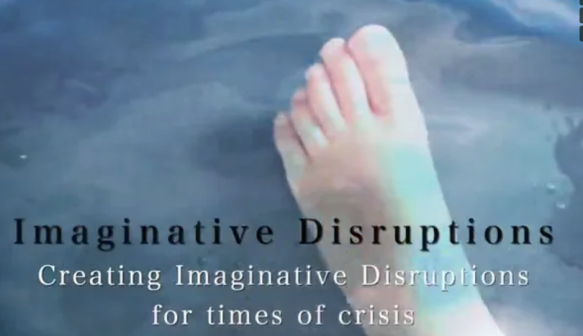
The Video
Taking place in 3 countries (Sweden, United Kingdom and The Netherlands) three ‘collective residencies’ brought together an intergenerational group of people who played, ate, (re)imagined, learned and created together, to design alternative futures around a selected ‘glocal’ issue, and explore what needs to be disrupted to realise these imagined realities; what is working with us and what is working against us? Two hopeful examples of local residents and one from academia show the power of arts-based approaches and the importance of hope and lightheartedness. The research was initiated and led by former MSc and PhD-students of mine, Natalia Eernstman
You can find more information and a link to the video here: Imaginative Disruptions Video
The Research
Imaginative Disruptions was a two-year creative research project that explored the transgressive potential of art and making to engage groups of citizens and experts in imaginative conceptions of alternative environmental narratives.
Underneath the project is the assumption that the structures and mind-sets of our modern society have made unsustainable living the default and sustainable living the exception. Acknowledging that environmental issues occur in the every-day lives of people rather than on drawing boards of technocrats, implies that designing and transitioning towards a more environmentally sustainable alternative should include citizen, lay or situated knowledges. There are some signs that such knowledge is recognized and demanded in both science and society (e.g. the push for citizen science and multi-stakeholder social learning). However, the practical realisation of processes that include public dialogue, in which citizens become critics and creators of knowledge, are fairly under-developed.
Here are some of the things we aimed to find out:
What arrangements and conditions are needed to disrupt daily routines and generate new ones?
Does the recognition and inclusion of situated knowledges generate radically different perspectives on how we can live well and environmentally, or do they represent the fine-tuning and, thereby, the maintenance of the status quo?
What happens if you put adults and children in the same learning arrangement and invite them to learn, play and experiment collectively? Chaos or…?
(How) is the knowledge produced through this heterogenous, vernacular, artistic, non-hierarchical and intergenerational process ‘useful’ to the community in question and a wider subject arena around it?
What is the added value of creative / artistic techniques in the social learning that will take place?
The ‘data’ of the research project emerged from the residencies with people talking, creating and reflecting together. We aimed to collect what the residencies generate in ways that don’t disrupt the activities, and allow us record things that we didn’t know we were going to document in advance.
More background information can be found on our Imaginative Disruptions website here: Imaginative Disruptions Home Page.

The Funding
The project was funded by the Swedish SEEDBox small grant scheme for innovative approached to education and research aimed at realizing a more sustainable world.
